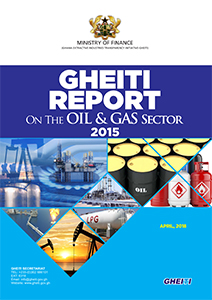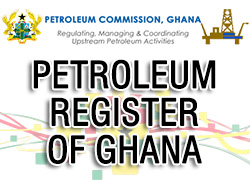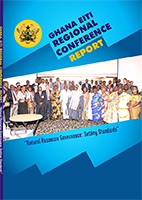| Ghana takes giant stride towards beneficial ownership disclosure |
 |
 |
 |
|
Ghana has for the past five years intensified its efforts at developing safeguards against illicit financial flows, money laundering, corruption, financing of terrorism and organised crime, under the direction and support of the Inter-Governmental Action Group against Money Laundering in West Africa (GIABA), a specialised institution of the Economic Community of West African States, responsible for facilitating the adoption and implementation of Anti-Money Laundering (AML) and Counter-Financing of Terrorism (CFT) measures in West Africa. The country’s intensified efforts followed its failure to meet key performance targets, including the establishment of a BO regime, during a GIABA peer review in 2012. Not much progress was, however, made, until Ghana’s EITI began to build the needed momentum for the beneficial ownership transparency agenda in the country by working together with stakeholders to identify the necessary amendments and harmonising conflicting legal issues. Until last year, none of the country’s laws provided for disclosure of beneficial ownership, making it easier for companies to hide the identities of their owners if necessary. Following the release of the Panama Papers and the global efforts to address issues related to anti-corruption and tax evasion, the government came under pressure to act on beneficial ownership. With the statement by the then President of Ghana, H.E. John Dramani Mahama at the UK Anti-Corruption Summit in May 2016, the agenda gained increased political commitment across the government. By holding national stakeholder consultations on the subject, Ghana EITI earlier on engaged actors including civil society organisations, relevant institutions and individuals working on open governance, financial integrity, private sector accountability, and extractive sector issues in the discussions. As a result of the consultations, a consensus emerged that the scope of beneficial ownership disclosure should be expanded beyond extractives and apply to all companies registered in Ghana. The Companies’ Act of 1963 was identified as the most appropriate legal instrument to establish a beneficial ownership regime. Incidentally, the Act was under review and consideration by Parliament, providing a timely opportunity for Ghana EITI and stakeholders to make input into the Bill. It soon became apparent that due to time constraint, and the huge amount of work required to be done on the Bill before the last Parliament rose, an amendment to the existing law under a certificate of urgency would rather be a more strategic way of providing in good time, the enabling legislation for BO disclosure in Ghana. The Company Act of 1963 was therefore amended in August 2016, paving the way for implementation of a beneficial ownership disclosure regime in Ghana. The law mandates the Registrar-General to collect the information as well as maintain the beneficial ownership register. Ghana EITI will in the coming year be working together with stakeholders on the practical issues related to collecting and disclosing the names and other details of companies’ real owners. Ghana’s new President, His Excellency Nana Addo Dankwa Akufo Addo, while in opposition declared his support for Beneficial Ownership disclosure, saying that: “It was necessary for lifting the veil off public officials who hide behind cronies to amass wealth through shady public procurements”. Early this month, the Vice President of Ghana, His Excellency Alhaji Dr. Mahamudu Bawumia, while opening an international conference on Beneficial Ownership in Accra, re-affirmed the government’s commitment to provide the needed support for making further progress with BO implementation. The objective for disclosing this information in Ghana is to improve the governance of the oil, gas and mining sectors. By providing for ownership disclosure for all registered companies the frontiers of transparency are expanded to sectors beyond the extractives and areas such as public procurement and contract allocation. Looking ahead, Ghana will need to develop an implementation framework with clear timelines to ensure that it stays on course, and works to meet the EITI 2020 deadline for operationalising BO disclosure regimes. Ghana does not intend to establish thresholds for now and disclosure will cover all levels of interest in a company. Discussions are currently on-going among key stakeholders, including civil society groups on how the Registrar-General could be supported to come up with an implementation plan. GHEITI says it is poised to coordinate these discussions at a roundtable meeting it is planning for the first quarter of 2017. There is no doubt that Ghana has made enormous progress in fulfilling its BO disclosure obligation in a short time and GHEITI certainly takes a chunk of the credit for this. |










